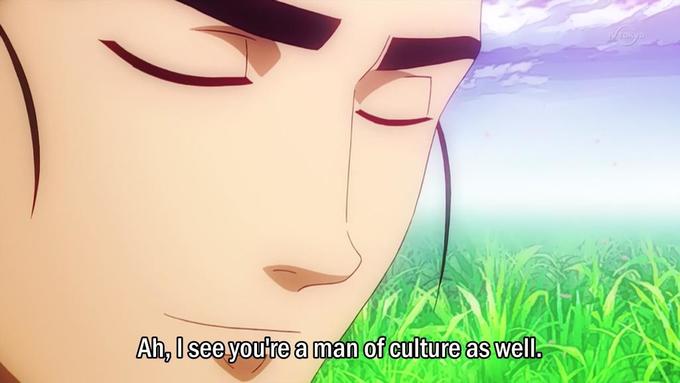You are using an out of date browser. It may not display this or other websites correctly.
You should upgrade or use an alternative browser.
You should upgrade or use an alternative browser.
Isekai Ten'i Shita node Cheat o Ikashite Mahou Kenshi Yaru Koto ni Suru - Vol. 1 Ch. 1.2
- Thread starter MangaDex
- Start date
Dex-chan lover
- Joined
- Apr 16, 2018
- Messages
- 1,712
Yes, yes, all the necessary ingredients for yet another fabulous trashekai is coming together!!!
*rubs hands*
😍
*rubs hands*
😍
Fed-Kun's army
- Joined
- Sep 22, 2018
- Messages
- 104
I hate how all it takes to make me read a manga is pretty art, regardless of how shitty the concept and plot is.
Member
- Joined
- Jun 23, 2019
- Messages
- 400
real question is why are there so many maids cleaning one room of that size
Dex-chan lover
- Joined
- Sep 10, 2018
- Messages
- 3,413
maybe the guard sent him to a brothel-like inn 😎
Double-page supporter
- Joined
- May 28, 2020
- Messages
- 1,432
Death penalty *sparkle sparkle*
Dex-chan lover
- Joined
- Nov 10, 2018
- Messages
- 2,546
The level of Salier and Guido are missing .
Salier is level 8 and Guido is 11.
Salier is level 8 and Guido is 11.
Dex-chan lover
- Joined
- Jul 26, 2020
- Messages
- 1,479
Lucky bastard
Member
- Joined
- Aug 19, 2020
- Messages
- 163
Active member
- Joined
- Sep 10, 2018
- Messages
- 121
The thing I never quite understood about isekais, why bother converting isekai currency to yen? And how would the MC even understand the value of money in another world? For example, a $50k salary in Buffalo, NY would have a much higher buying power than a $50k salary in NYC. I'm sure it's the same in Japan - compare Kyoto to Tokyo. Talk about comparing apples to oranges...
Dex-chan lover
- Joined
- May 1, 2018
- Messages
- 1,002
@Vincentius @kornboi @ShionSinX
ShionSin is correct. All these isekai that convert fantasy money to yen are straight-up retarded. That's not how money works. The value of things depends on so much - scarcity being one of the most. You cannot know an exchange rate by going "hmm, a copper coin buys a loaf of bread, and a loaf of bread is 100 yen, therefore 100 yen = 1 copper." It doesn't work that way.
First, for all we know, the MC might just happen to be in a town near where wheat is grown, and thus baked goods are cheap. Or he might be in a town where the only bakery burnt down last week and he's paying 10x as much as normal. The entire point of a merchant class is that things cost more in one location and less in another. So knowing the cost of a piece of bread or a night at an inn in one town does not tell you that's the universal cost - it doesn't even tell you the cost of an inn in THAT town, as there could be cheaper/more expensive options.
Second, there must be an exchange of currency for there to be an EXCHANGE RATE. (And of course, exchange rates fluctuate right here in the real world. 1 dollar = 100 yen isn't even true on Earth from day to day.
Third, a world's economy depends on its resources, which may or may not be similar to earth's resources. For all we know, the MC could have isekai'd himself into a world where diamonds are super plentiful and quartz is exceedingly rare, or where certain technologies and resources aren't readily available.
Fourth, there's all kinds of services and items for which the MC is just not going to have any kind of frame of reference. Let's say he wants to buy a new sword. Does the MC know how much a hand-forged longsword costs in Japan? Why would we expect there to be a 1:1 ratio of costs of longswords or wagon wheels or buggy whips or horses just because he thinks bread is similarly priced?
To use a real-world idiom, "What does that have to do with the price of tea in China?"
ShionSin is correct. All these isekai that convert fantasy money to yen are straight-up retarded. That's not how money works. The value of things depends on so much - scarcity being one of the most. You cannot know an exchange rate by going "hmm, a copper coin buys a loaf of bread, and a loaf of bread is 100 yen, therefore 100 yen = 1 copper." It doesn't work that way.
First, for all we know, the MC might just happen to be in a town near where wheat is grown, and thus baked goods are cheap. Or he might be in a town where the only bakery burnt down last week and he's paying 10x as much as normal. The entire point of a merchant class is that things cost more in one location and less in another. So knowing the cost of a piece of bread or a night at an inn in one town does not tell you that's the universal cost - it doesn't even tell you the cost of an inn in THAT town, as there could be cheaper/more expensive options.
Second, there must be an exchange of currency for there to be an EXCHANGE RATE. (And of course, exchange rates fluctuate right here in the real world. 1 dollar = 100 yen isn't even true on Earth from day to day.
Third, a world's economy depends on its resources, which may or may not be similar to earth's resources. For all we know, the MC could have isekai'd himself into a world where diamonds are super plentiful and quartz is exceedingly rare, or where certain technologies and resources aren't readily available.
Fourth, there's all kinds of services and items for which the MC is just not going to have any kind of frame of reference. Let's say he wants to buy a new sword. Does the MC know how much a hand-forged longsword costs in Japan? Why would we expect there to be a 1:1 ratio of costs of longswords or wagon wheels or buggy whips or horses just because he thinks bread is similarly priced?
To use a real-world idiom, "What does that have to do with the price of tea in China?"
Similar threads
- 32
- Replies
- 1K
- Views
- 17
- Replies
- 556
- Views
- 0
- Replies
- 41
- Views
- 22
- Replies
- 703
- Views
Users who are viewing this thread
Total: 2 (members: 0, guests: 2)

